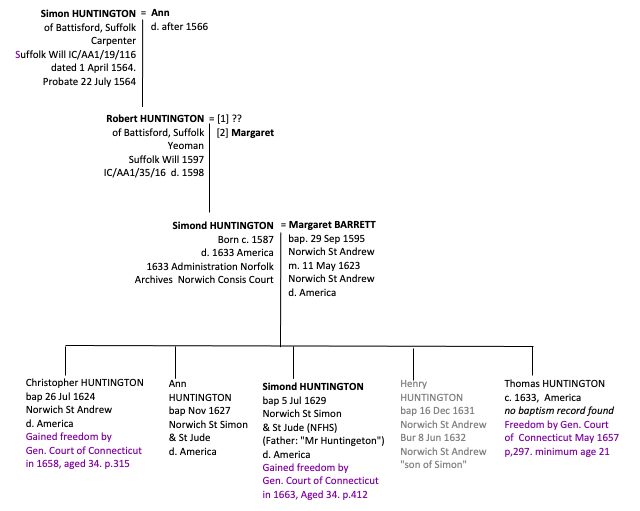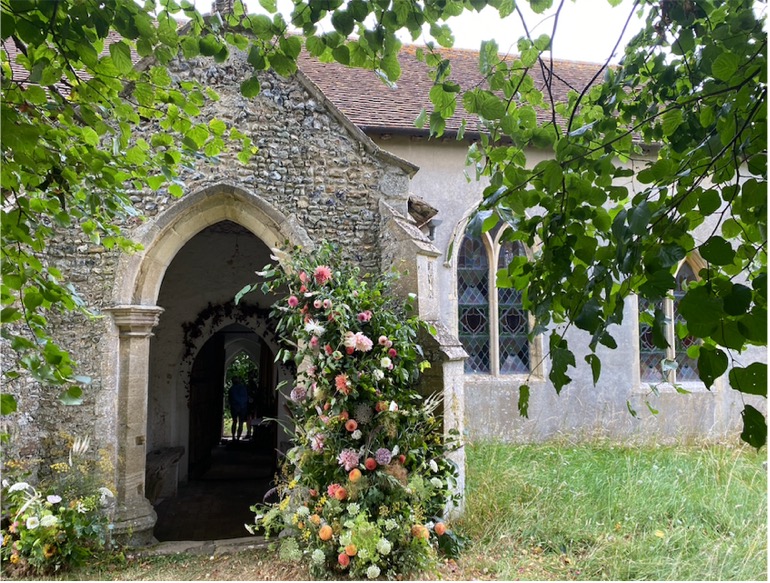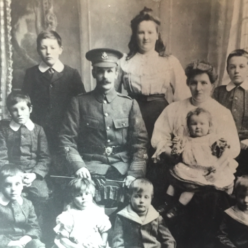14 October 2024
Have you researched back on a family line, only to get stuck in the 16th or 17th Centuries, due to a lack of online parish records, or uncertainty about who is the right person? Or perhaps your English ancestor migrated to America around this time and you’re trying to gain clarity about their parents who you think came from a certain part of England. Researching surviving wills may help. I use the case of Simon Huntington, who travelled to New England in 1633, leaving an ongoing question mark over his English paternity and ancestry for his many descendants.
Simon Huntington and his wife Margaret Barrett (or Baret) are recognised by many North American Huntington descendants, genealogists and researchers, past and present, as their earliest known ancestors, both born in Elizabethan England [1] [2] [3]. Simon and Margaret and at least four of their children were most likely passengers on board the ship Elizabeth Bonaventura which departed from Yarmouth, Norfolk, England, in the first week of May, arriving at Boston, Massachusetts, on 15 June 1633, in which Simon reportedly died “by way of the small pox”[4], perhaps a victim of the Massachusetts smallpox epidemic that affected the state in the 1630s [5]. News of Simon’s demise must have set in motion the relevant probate paperwork, because a Norwich Consistory Court index record in England dated 1633 survives for the Administration of Simon Huntington’s estate [6], although unfortunately the original document appears to have been lost. Some forty years later, on 4 November 1671, Thomas Barrett of Norfolk, officially stated that Margaret Barrett had “married to one Symond Huntington whoe Carried her to New England & had several Children by her but wee can give noe account of her or them, yet thinke that shee & several of her Children are Livinge there”[7].
Simon and Margaret married on 11 May 1623 at St Andrews church, Norwich, Norfolk, England. Two records of their marriage survive: in the parish register of St Andrews [8] and an Archdeacon’s Transcript (a copy) of their marriage entry [9]. Margaret’s birth in Norwich and her parents have also been credibly established [10]. Simon’s parentage, however, has not been evidenced. The aim of the research, therefore, was to establish what evidence from wills and other records could be uncovered in support of answering the essential question: Who were Simon Huntington’s parents and grandparents?
The research findings in response to this question are provided in my article. A section of the family chart developed from the research findings is shown below. The article includes case studies relating to individuals called Huntington, who wrote the wills, which I transcribed and analysed. Also included in the article is a larger family chart showing the inter-connections between these different individuals, reflecting the findings in the wills. With thanks to those who introduced me to the Huntington family of North America and to those who helped along the way.

Descendants of Simon Huntington of Battisford, Suffolk, England, died 1564.

Footnotes
[1] Huntington Family Association., Huntington, S., Huntington, R. Thomas., Huntington, S. Gladding. (1915). “The Huntington family in America: a genealogical memoir of the known descendants of Simon Huntington from 1633 to 1915, including those who have retained the family name, and many bearing other surnames.” Hartford, Conn.: Huntington family association. pp.647 & 648.
[2] Anderson, Robert Charles. “New England the Great Migration and The Great Migration Begins, 1620-1635 for Margaret Stoughton. Vol 2. G-O” pp.1044-6. https://www.ancestry.co.uk/discoveryui-content/view/55047:2496 : accessed 17 June 2024.
[3] Huntington, E.B. et al. (1863-1915). “The Huntington Family in America. A Genealogical Memoir of the Known Descendants of Simon Huntington from 1633 to 1915.” Huntington Family Association, Hartford, Conneticut. https://archive.org/details/huntingtonfamily00hunt/page/n9/mode/2up : accessed: 17 June 2024.
[4] Ibid. p. 647 referencing: Church Records. USA. Roxbury, Massachusetts. 1633. Account by Rev. John Eliot. “Margaret Huntington widow; she came in the yeare 1633. Her husband dyed by way of the small pox, she brought children with her”.
[5] Byrne, Joseph Patrick (2008). “Encyclopedia of Pestilence, Pandemics, and Plagues” [2 Volumes]. Westport, Conn: Greenwood Press. p.664.
[6] Probate Records. England. Norwich, Norfolk. 1633 Grant of Administration Index. Huntington, Simon of Norwich, Norfolk. Norwich [Bishop’s] Consistory Court. Norfolk Record Office, Norwich. PRCC/2. https://nrocatalogue.norfolk.gov.uk/huntington-simon-of-norwich-norfolk : accessed 17 June 2024.
[7] In: Muskett, Joseph James. (1905). Suffolk Manorial Families. Volume 2, Statement of Thomas Barrett of Norwich to Sir Edward Bysshe, 4 November 1671 (Add. MS 22,883, fo. 40). Page 159. https://archive.org/details/suffolkmanorialf02john/page/158/mode/2up : accessed 15 July 2024.
[8] Marriage Records. England. St Andrews Parish Register, Norwich, Norfolk. 11 May 1623. Simondi Huntintonne and Margrot Barrott. Norfolk Records Office.
[9] Marriage Records. England. Archdeacon’s Transcripts, Norfolk. 11 May 1623. Simond Huntenton and Margret Barrit. Norfolk Record Office.
[10] Jacobus, Donald Lines (1952) “Hale, House, and related families”. Margaret (Baret) Huntington. Roxbury, MA. Pp 647-651. https://babel.hathitrust.org/cgi/pt?id=wu.89066151523&view=1up&seq=669 : accessed 17 June 2024.
